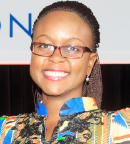
Dorothy Lombe, MD
I am a radiation oncologist from Zambia, where we only have one cancer center offering radiotherapy—and I will beat cancer. This bold statement often evokes a look of surprise. However, if the conversation is allowed to go on, I’ll say cancer is beatable even where resources are thin.
I am fortunate to have been a recipient of the Conquer Cancer International Development and Education Award in 2016 and now the Long-Term International Fellowship for 2018–2019, allowing me to interact and visit with mentors from well-resourced environments. There are a couple of important lessons I have learned from these interactions that have culminated into my bold statement. It does not involve copying and pasting what I see and pressuring my country’s government to match the top-of-the-range facilities and equipment I’ve seen elsewhere—that is simply not feasible or sustainable. It is about taking knowledge and applying my experience to innovate interventions that work for my patients.
In summary, this is what I have learned on who I am and what I will do: the magnitude of resources is irrelevant, but the capacity to manage them is what matters. The three pillars of cancer control are prevention, treatment, and palliation, and I believe the ability to beat cancer lies in harnessing these pillars and managing the situation before you. Prevention and early detection are really the best cost-effective measures we can take, but perfecting them in low-resource environments will take some work.
Many a clinic day, I am faced with three-quarters of the cases coming in as locally advanced and incurable. The first intervention—which costs the system nothing but means everything to patients and their families—is my team’s empathy and respect for their being. I have come to respect that beating cancer is different from curing cancer. Taking care of the physical, spiritual, and mental well-being of a patient, and reaching a point where patients and their families understand what is happening in regard to their disease, are my formula for beating this beast. Yes, my patients may die, but they will not die in pain and without dignity.
A second lesson that I have quickly learned from my mentors is no matter the environment, research must be part of practice to elicit patterns of disease and outcomes of treatment. Always ask, “Why?” and “How can I do better with what I have?” Earlier in my career, I remember waiting to be awarded research grants that are so well advertized yet unreachable. Yes, funding does help us, but we can still dip our toes in the pond with good systematic record collection with a pen and paper, so that when the funding does come eventually, we will be well prepared. It is especially important for local specialists to take ownership of the research process and participate in dissemination of results and conversations on the global forum, as subsequent international guidelines may not be inclusive. Meticulous record-keeping and protocols are the first step to getting into the arena of big data, and they are low- to no-cost interventions simply requiring realignment of existing personnel in an already-funded system.
So, on this note, I end by saying again I am a radiation oncologist from a country with 1 radiation therapy center for 17 million people—and I will beat cancer in Zambia. ■
Dr. Lombe is a clinical and radiation oncologist at the Cancer Diseases Hospital in Zambia. During her Long-Term International Fellowship year, she is training at BC Cancer Agency, Canada, under the mentorship of Dr. Juanita Crook. She is a member of ASCO’s Resource-Stratified Guideline Advisory Group. Follow her on Twitter @lombe_dorothy.
This essay was originally published on ASCO Connection on February 4 in observation of World Cancer Day. ©American Society of Clinical Oncology. “Who I Am and What I Will Do on World Cancer Day.” ASCO Connection, February 2019. All rights reserved.

